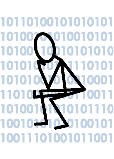
Human-Centered Computing Seminar
Fall '98, 110 South Hall, Thurs 3-4:30pm.
CS 298-31 ccn:25219
SIMS 290-4
 |
Human-Centered Computing SeminarFall '98, 110 South Hall, Thurs 3-4:30pm.CS 298-31 ccn:25219 |
Instructors: John Canny, 529 Soda Hall, x2-9955, jfc@cs.berkeley.edu, office hours Tu-W 2-3pm
Marti Hearst, 212 South Hall, x2-8016, hearst@sims.berkeley.edu
New: HCC Readings: Here is a list of HCC-related books. Please feel free to suggest additions to it.
Computing and information technology are dramatically changing peoples' lives, and more change is to come. Ubiquitous computing promises new ways for computing to assist people, and for interaction on the human's rather than the machine's terms. Computers will function in human contexts, rather than requiring people to learn and follow the machine's rules. That assumes a thorough understanding of those contexts. HCC is an interdisciplinary program involving sociology, psychology, and education theory as well as computer science and engineering. Its goal is to study social contexts and human behavior, to design and evaluate computer applications in those contexts. HCC can be viewed as an evolution of HCI (Human-Computer Interaction), but represents a shift in perspective. HCC is not an area within computer science, but represents a theme that impacts all areas of CS. It coincides with the transition of computing from tools built for and by professionals to invisible infrastructure for everyday tasks for "every citizen". Understanding the complexity and diversity of human behavior will be an important first step in building the future "killer applications" of computing.
The course will include talks by leading researchers from on and off campus on HCC-related topics. The talks will be about current research but will be colloquium-style and accessible to a broad audience. The goal is to allow graduate students from one of the participating areas to undertake research that cuts across the HCC areas, or to partner with students from other HCC fields.
The course web page is http://www.cs.berkeley.edu/~jfc/hcc/seminar.html while the general HCC project page is http://www.cs.berkeley.edu/~jfc/hcc/.
To add yourself to the course mailing list, send an email to majordomo@sims.berkeley.edu and in the body of the message put "subscribe hcc-talks". Don't put anything in the subject line.
Schedule for Fall '98
| Date | Speaker | Title |
| 8/27/98 | John Canny UCB Computer Science |
Overview of HCC: abstract and talk slides. |
| 9/3/98 | James Landay UCB Computer Science |
Informal User Interfaces for Natural Human-Computer Interaction |
| 9/10/98 | ||
| 9/17/98 | Marcia Linn, Sherry Hsi et al. UCB Grad School of Education |
Panel on the CILT project (CILT is the Center for Innovative learning technologies) |
| 9/24/98 | Andrea diSessa UCB Grad School of Education |
Open toolsets for educational software |
| 10/1/98 | Marti Hearst UCB - SIMS |
When Information Technology "goes social" (slides) |
| 10/8/98 | Linda Stone/ Steve Drucker Microsoft Corporation |
Overview of Microsoft's Virtual Worlds Group |
| 10/15/98 | Richard Newton UCB - EECS |
Context-aware design of MEMS sensors |
| 10/22/98 | Paul Maglio IBM Research Almaden |
Applications of intermediaries on the web |
| 10/29/98 | Jerry Mendelsohn, Joanie Connell UCB Psychology |
The Cyberbias: Do Perceptions of People's Behavior Differ in Cyberspace? |
| 11/5/98 | Nancy Van House UCB - SIMS |
Cooperative Knowledge Work and Practices of Trust: Sharing Environmental Planning Data Sets |
| 11/12/98 | ||
| 11/19/98 | Donald A Norman The Nielsen-Norman group |
The Invisible Computer: Why the computer industry doesn't work the way you think it should. |
| 12/3/98 | Krasi Kolarov and Bill Verplanck Interval Research Corp |
Haptics and Robotics for almost-tangible human-computer interfaces |